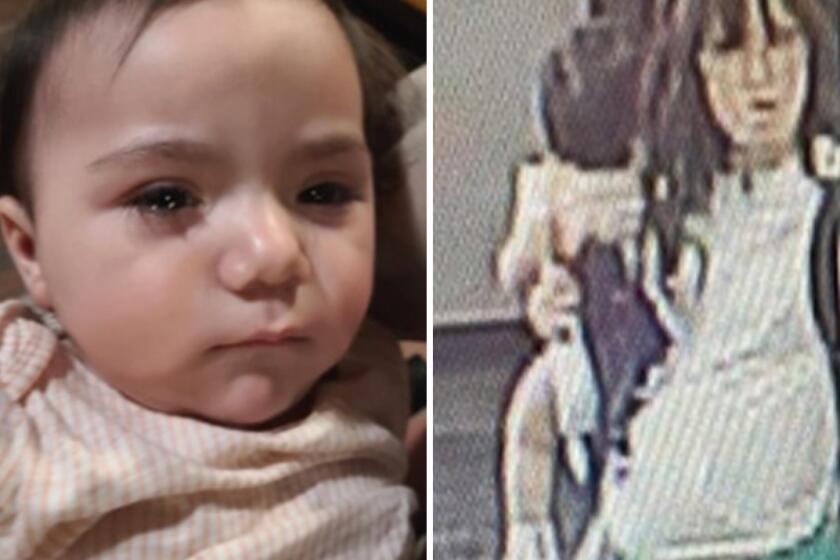O.C. Aims to Unearth Wrongful Convictions
Beginning a novel partnership to identify innocent people behind bars, Orange County’s district attorney and public defender Wednesday sent hundreds of inquiries to prison inmates across the state and established a committee to evaluate the replies.
The questionnaires were mailed to each of California’s 33 state prisons, asking inmates convicted in Orange County to explain whether they know of any physical evidence--such as DNA or fingerprints--that could prove their innocence.
A panel consisting of two prosecutors, a deputy public defender and a Chapman University law professor will then screen the questionnaires to decide whether they merit further investigation.
Orange County’s teaming of prosecutors and defenders is considered the boldest of several efforts across California to use cutting-edge DNA analysis to take a second look at whether prisoners were wrongly convicted.
“Orange County is leading the way. That’s a very exciting concept and hopefully one that will catch on,” said Gerald Uelman, a noted legal scholar and Santa Clara University law professor. “I’m not aware of any program in the country that combined the resources of prosecutors and defenders to undertake that kind of review.”
Dist. Atty. Tony Rackauckas and Public Defender Carl Holmes spent two months haggling over details of the program before making it official Wednesday. The sheriff’s crime lab will conduct any needed DNA testing or fingerprint examinations.
The overture to prisoners--the questionnaires were published in both English and Spanish--marks the first time Orange County prosecutors have actively solicited claims of innocence. But the survey includes a disclaimer noting that any blood and DNA evidence that prisoners provide could be used to implicate them in other crimes.
Orange County sends an average 4,000 people a year to state prison, so officials are bracing for a flood of responses. “There is . . . going to be a lot of filtering for us to do,” Holmes acknowledged.
Rackauckas said he does not believe Orange County courts have sent many wrongfully convicted inmates to prison, but he believes the prospect of freeing even one innocent person is worth the time and energy the project will entail.
In the past eight months, the district attorney’s office has freed two inmates after questions were raised about their guilt. DeWayne McKinney spent 19 years in prison for an Orange County murder before his release in January; Arthur Carmona was released in August after spending more than two years in prison for armed robberies he said he didn’t commit.
While neither of those cases involved DNA evidence, Rackauckas said the project will focus on cases in which previously untested physical evidence could help prove an inmate’s innocence. An ideal case would be one in which police preserved evidence such as blood, semen or hair samples from a crime committed before the advent of DNA testing, he said.
That’s what happened in 1996, when the district attorney’s office released convicted murderer Kevin Green after DNA testing showed that another man raped and killed Green’s wife. The other man was convicted and sentenced to death.
Sheriff’s Department lab director Frank Fitzpatrick said his department spends about $2,500 to conduct a DNA test. It’s a worthwhile expense, Fitzpatrick said, because it could help free an innocent man and perhaps identify a criminal who has gone unpunished.
The public defender’s office is also planning a separate “innocence project” that will include the county’s private criminal defense attorneys and law students from Western State University College of Law.
Holmes said he has already identified one case to examine--he declined to discuss the details--that could include some previously untested biological evidence. If it develops as expected, Holmes said he would be eager to include prosecutors in the investigation.
Advances in DNA and other crime-science technology has prompted law enforcement agencies across the nation to take a second look at old cases. Both houses of the California Legislature recently passed legislation offering DNA tests to inmates who can prove that it probably would have led to exoneration or a shorter sentence.
The Orange County union between traditional adversaries was prompted a few months ago when Holmes and Rackauckas learned that each was planning innocence projects. Both men had played active roles in the McKinney case: Rackauckas prosecuted him; Holmes defended him at a sentencing trial.
“He’s let the fox into the hen house,” Holmes said. “We’re breaking down some of the adversarial barriers we have in the system in order to address these issues.”
More to Read
Start your day right
Sign up for Essential California for news, features and recommendations from the L.A. Times and beyond in your inbox six days a week.
You may occasionally receive promotional content from the Los Angeles Times.







